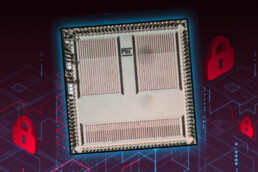Toward a stronger defense of personal data
Engineers build a lower-energy chip that can prevent hackers from extracting hidden information from a smart device.
A heart attack patient, recently discharged from the hospital, is using a smartwatch to help monitor his electrocardiogram signals. The smartwatch may seem secure, but the neural network processing that health information is using private data that could still be stolen by a malicious agent through a side-channel attack.
A side-channel attack seeks to gather secret information by indirectly exploiting a system or its hardware. In one type of side-channel attack, a savvy hacker could monitor fluctuations in the device’s power consumption while the neural network is operating to extract protected information that “leaks” out of the device.
“In the movies, when people want to open locked safes, they listen to the clicks of the lock as they turn it. That reveals that probably turning the lock in this direction will help them proceed further. That is what a side-channel attack is. It is just exploiting unintended information and using it to predict what is going on inside the device,” says Saurav Maji, a graduate student in MIT’s Department of Electrical Engineering and Computer Science (EECS) and lead author of a paper that tackles this issue.
Chip photo courtesy of the researchers
